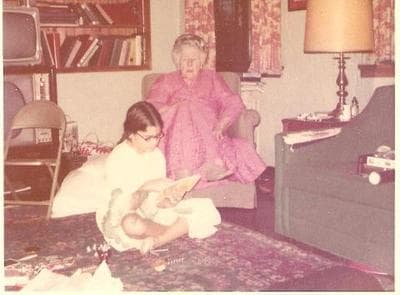Advertisement
Vote For Gagi — Or Anyone You Like
I’m voting for my grandmother today. She died in 1985, and she never ran for any office outside the Garden Club, so I guess I have some explaining to do.
Katherine Lucille Glidden, born in Brooklyn in 1891, married Grafton Sherwood Kennedy in 1917. They had three children, one of whom was my father. By the time I met her, Kay had been given the nickname by which all her grandchildren knew her: Gagi, pronounced to rhyme with “groggy” – though she was anything but.

In fact, Gagi was a woman of remarkably strong opinions, strongly and frequently expressed. As a child I was most fascinated by her views on food – despite decades of living in Massachusetts, she clung firmly to her recipe for Manhattan clam chowder – but as I grew older, it was her political fervor that seemed most striking. We often disagreed, but I never regretted arguing with her; her views were considered, mostly reasonable and always, absolutely, her own.
Which is why it was always incredible to me – and still is to this day – that, until she was 29 years old, she could not do something that most of us now take for granted. She was a woman, and so she could not vote.
“Women’s suffrage” has a kind of quaint, historical air, doesn’t it?
We picture ladies in white shirtwaists and Gibson Girl coiffures, picketing prettily in front of the White House (or, in my case, parading in London, because my first encounter with the word “suffragette” was the mother in “Mary Poppins”). There’s something almost silly about it; that “-ette” suffix does have a way of draining the seriousness out of almost anything. And yet it was, for my grandmother and for millions of women like her, a movement that asserted something she simply could not take for granted: that she was a full citizen of the United States, with all the rights a citizen holds.
Until she was 29 years old, my grandmother could not do something that most of us now take for granted. She was a woman, and so she could not vote.
What’s stunning about this, really, is how recent it was. Ladies, it has not even been a hundred years. Congress passed the 19th Amendment, granting us the right to vote, in 1919, but it was not ratified by the necessary 36 states until August 18, 1920. Even then, it was contested in many of the remaining states; Mississippi, for one, did not formally ratify the amendment until 1984. 1984!
I’ve taught a few college journalism courses in the last couple of years, and I’ve been dismayed at how many students tell me they’re not really interested in politics. (This makes me wonder why they’re interested in journalism, but that’s a topic for another day.) I’m especially dismayed to hear this from young women. It’s one thing for white property-owning men to take the vote for granted; they’ve always had it. But if, like me, you can’t check off all those boxes, how can you fail to check off the boxes — whichever ones you like — on a ballot today? How can you let our grandmothers’ — my grandmother’s — fierce assertion of their full humanity dwindle into complacent indifference?
Advertisement
And that’s why I’ll be voting today, as I do in every election, for my grandmother. I’m voting for Gagi. I hope you will too.
This program aired on November 6, 2012. The audio for this program is not available.